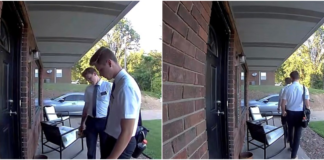The box looks like it would hold a wedding dress — it’s white, rectangular and shiny. It sits on the shelf above Christopher Andrew Leinonen’s old bed, the one he slept in when he came home from college.
Christine Leinonen, his mom, balances on the bed to retrieve the box. There aren’t wedding clothes inside. It wasn’t until Christopher was 31 — in 2015, the year the Supreme Court legalized marriage equality — that he let himself dream of marriage. That was the year he told his mom he wanted to marry his partner, Juan Guerrero.
Inside the box a bluish gray T-shirt, skinny jeans, black sneakers, a belt, green striped underwear and a teal wallet nestle together — the last outfit worn by Christopher, whom friends called Drew. Christine lifts the shirt to her face. It doesn’t smell like him. It still carries a chemical scent of sanitizing liquid, the stuff used to get blood out. She pokes at the holes in the chest of the shirt.
“You can see that these bullets that go through, they’re not that dramatic, they’re teeny,” Christine says. She lifts his jeans. The same tiny holes run up and down the legs. She points out a spot by the ankle where a hole goes clean through both sides.
Christopher was among the 49 people gunned down at Orlando gay nightclub Pulse on June 12, 2016. Since then, Christine’s home — a cluttered three-bedroom she downsized into to save enough money in order to send Christopher to college — has served as a kind of personal memorial.
“I want everything that belongs to Christopher,” she stammers. Her eyes are wet, but she holds back the tears.
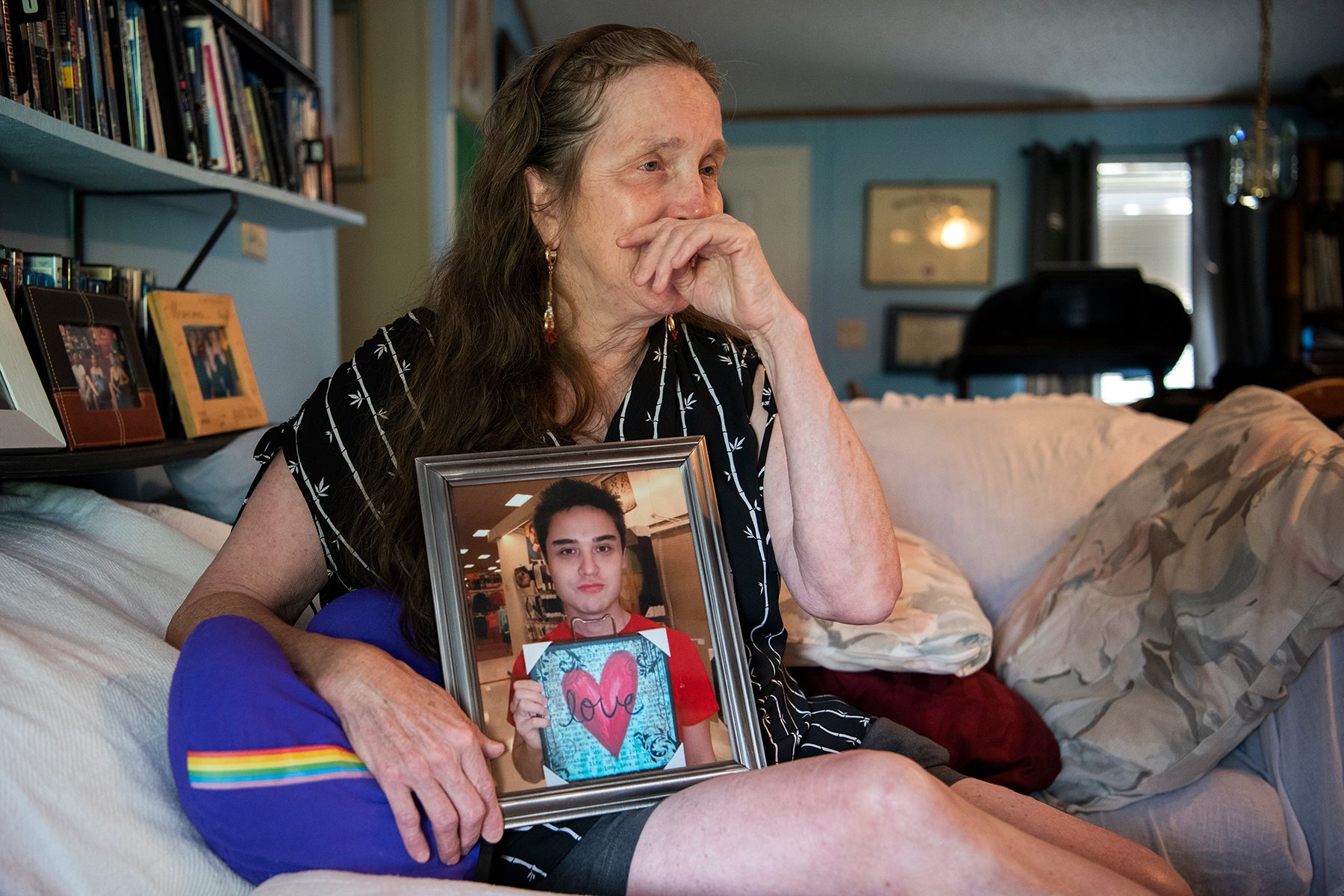
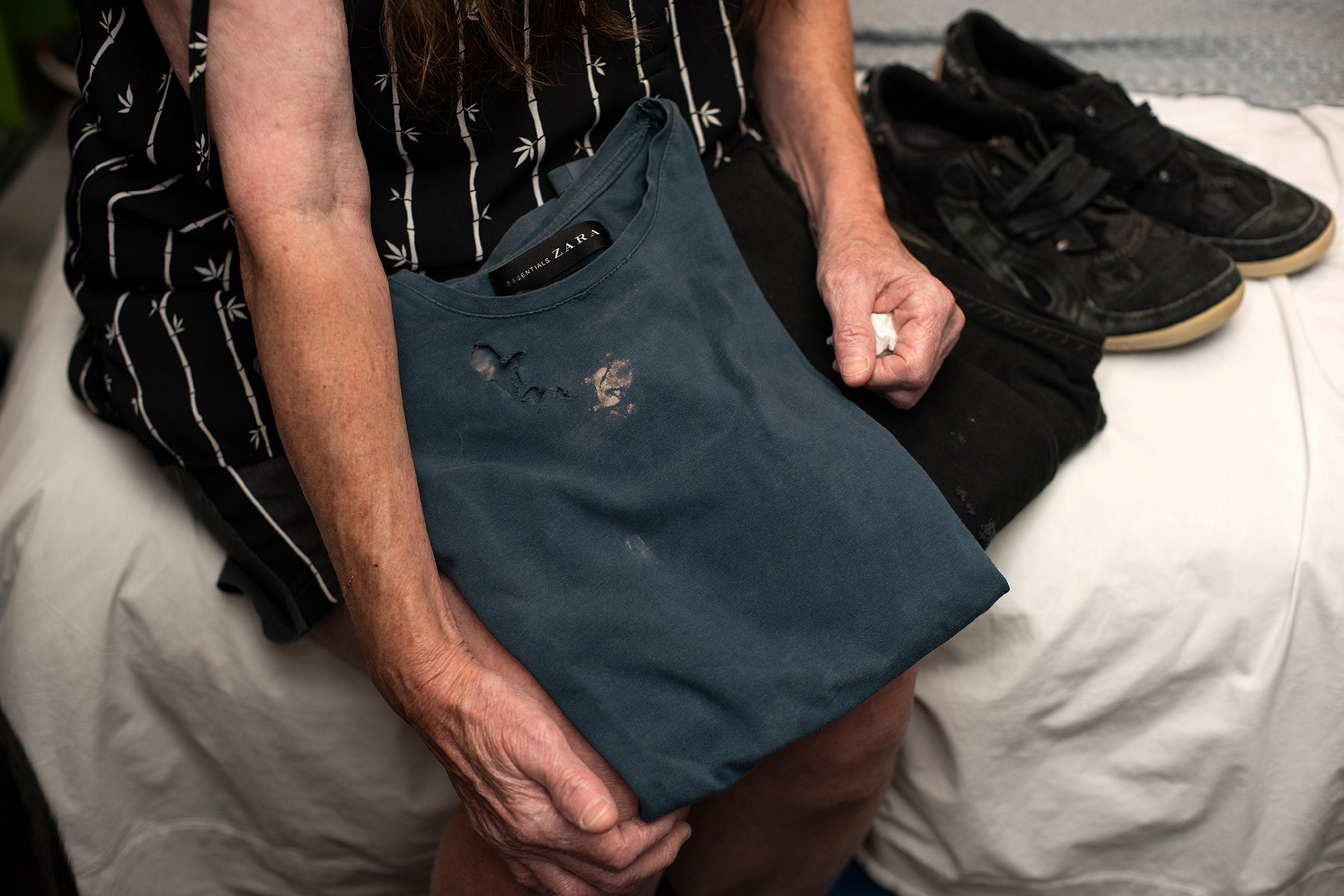
Pulse — the site of the most deadly LGBTQ+ massacre in U.S. history and the second deadliest mass shooting in the country — remains standing. Its fading facade is wrapped in photos and flowers. The site draws a steady stream of tourists, especially in June when Orlando marks another year since the shooting. A $45 million museum is slated to open just blocks from the club, a place for people to come and remember Christopher and the 48 other victims, including his partner, Juan Guerrero.
Six years after the shooting, many are marking the anniversary. Still, some victims’ families and survivors are angry about how the shooting has been memorialized. The museum, they worry, is turning a site of dozens of deaths into a tourist attraction. They don’t want that, but they also don’t want it to be erased, a worry that stems from a new state law that limits what teachers can say about sexual orientation and gender identity.
The Parental Rights in Education Bill, dubbed “Don’t Say Gay” by opponents, is a vaguely worded piece of legislation that aims to limit discussion of gender and sexuality in schools. Proponents say it shields kids from learning about sensitive issues at too young an age. But LGBTQ+ advocates fear kids won’t learn about their own local history.
Will teachers in Orlando be able to talk about the massacre at Pulse? Will they be too scared of potential consequences under the new law to figure out how to tell students about this part of the city’s history?
Will Larkins, 17, says they will tell people about Pulse, whether or not teachers do. Larkins is gay and nonbinary and just finished their junior year of high school in Orlando. They have become a voice for queer youth nationally.
“I’m like ‘history lesson: you have to know your culture, you’re in Orlando,’” Larkins says. “I think it’s very important that people go there and really think about everything that’s happened surrounding this area. And look into the eyes of the people who were killed and their families, and what their families have put up, and see that these are real people with little possessions and inside jokes on the wall that we will never understand because they’re gone.”
A few weeks before the anniversary and a few miles from Pulse, Larkins went in front of the Orange County Public Schools board meeting and asked that the board ensure that queer youth have books that reflect them in light of the “Don’t Say Gay” law and the rise of book bans.
Larkins and their peers were escorted by police out of the meeting, Larkins was dragged by their shirt collar, singing, “Let us read!” They were met by protesters outside.
Larkins has been accused of being a “groomer,” the euphemism for the trope of gay pedophile weoponized against LGBTQ+ people in the 1970s and, more recently, against people who are protesting against bills like Don’t Say Gay. (Larkins point out that, at 17, they are a kid — “I can’t be a groomer.”)
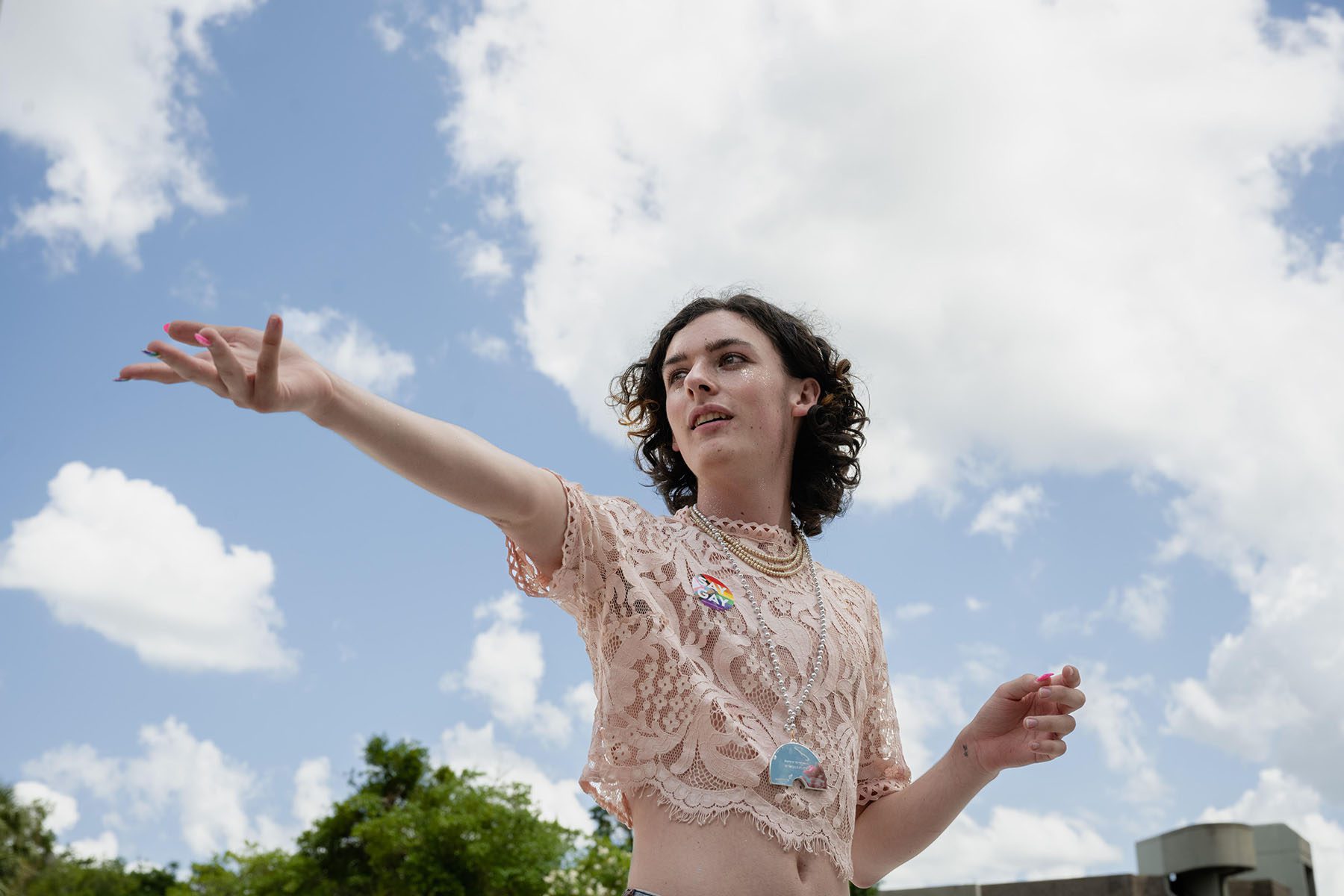
For them, the fight to be openly queer at school, to not worry about laws that may limit what they can say about themselves, feels like life or death.
“We are protesting out of survival,” they say. “We are discriminated against in schools, and we know that we can get worse, and we know that we can revert back.”
Jen Cousins, a parent in the district, was with Larkins and other queer youth in the statehouse when “Don’t Say Gay” passed. She cried with the kids, and offered them mom hugs. Her 12-year-old, Saffy, is nonbinary, and Cousins joined the fight against anti-LGBTQ+ legislation, but some of these kids don’t have support from their parents, she says. She worries about a lot of them. The stakes are high. The world outside is not kind to queer children, especially not now.
In May, queer youth nonprofit the Trevor Project reported that 45 percent of youth had considered suicide. LGBTQ+ advocates worry that when school resumes this fall, the “Don’t Say Gay” law will mean kids without supportive parents will lose a safe space they have to be openly queer, where they can hear names and pronouns that match who they are.
Cousins founded the Florida Freedom to Read Project, a group that has been opposing book bans in Florida. She recalls giving her 12-year-old the book “Gender Queer,” a book that has been banned from Orange County School library shelves.
“It was such a comfort to them,” Cousins said. They were like, ‘this makes everything fall into perspective for me now, why I feel the way I feel.’”
Supportive parents like Cousins text each other articles illustrating what can happen if their kids don’t get support. This week it’s a 13-year-old boy who died by suicide. How will they keep their own children from becoming those headlines? They ask each other. How do they support their children’s friends whose parents don’t want them to be LGBTQ+?
Outside the school board protest, Brandon Wolf tells kids that he remembers what it was like to be told he was wrong for being a queer kid.
“Those hateful, bigoted people that told me that I was less than because of who I am, wanted me to run away,” he tells students.
Wolf, a spokesperson for statewide LGBTQ+ rights organization Equality Florida, does this work in honor of his best friend, Christopher Leinonen. Christopher had fought for equality from the time he was a teen, starting the first Gay-Straight Alliance at Seminole High School 2 ½ hours southwest of Orlando.
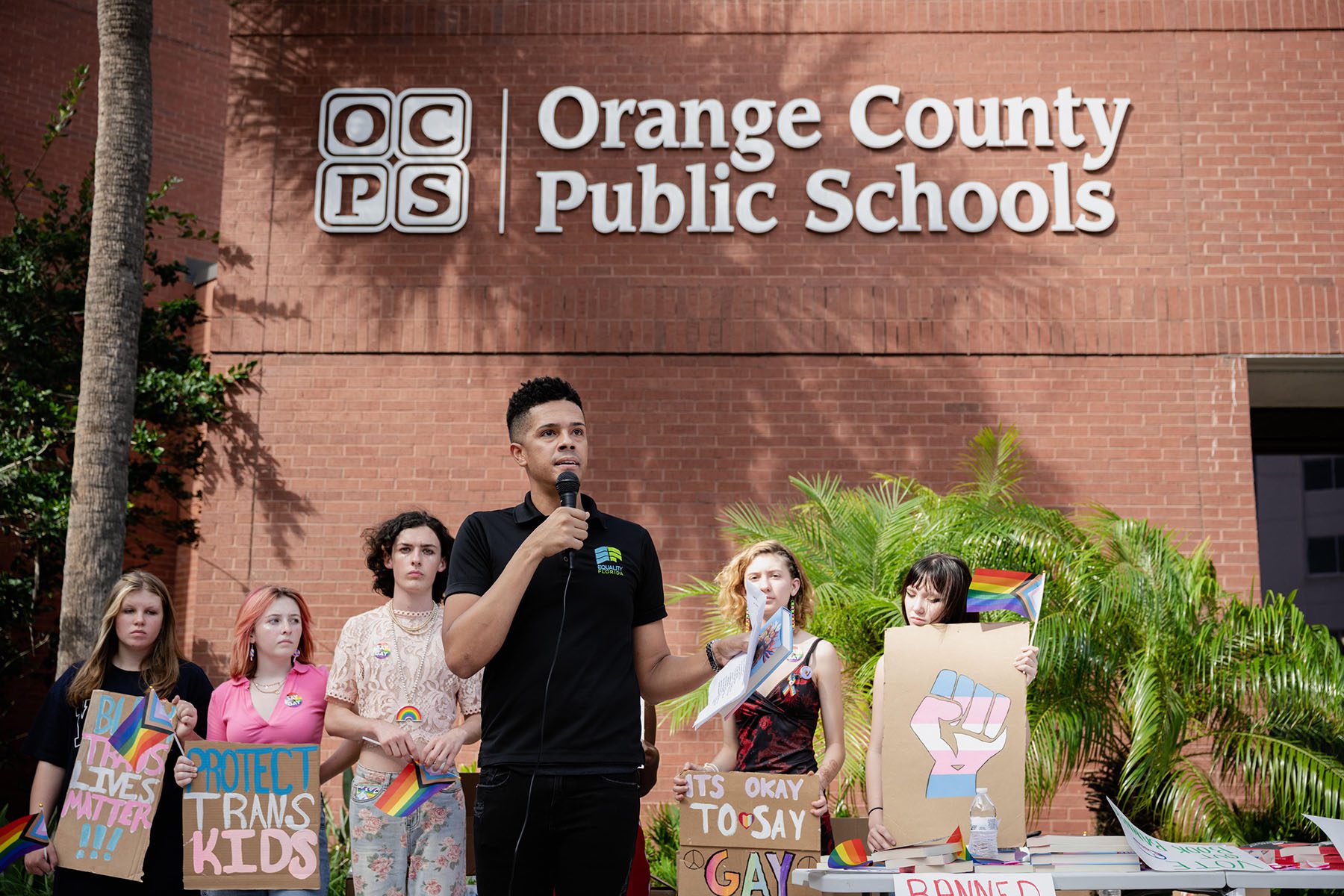
Wolf was with Christopher and his partner that night. He survived the shooting and has gone to comfort legions of new victims made in mass shooting after mass shooting since June 2016. He’s also fighting anti-LGBTQ+ policy.
Wolf doesn’t mind Pulse still standing just miles away from the protest. It’s a difficult space for him personally, one he doesn’t like visiting himself.
“It’s always been deeply important to me that whatever we did to honor those victims include a component that continues their stories, that continues their legacies, that teaches people why Pulse was even important in the first place,” he said.
On March 7, Larkins led a walkout of Winter Park High School, and more than two-thirds of the school exited the building. Queer youth and their friends aren’t going back in time, they said. Larkins believes their generation is about to start heading to the polls. LGBTQ+ rights are broadly popular with Americans, according to polls, but even more so with younger voters. The lawmakers passing anti-LGBTQ+ legislation have limited time in office, Larkins says.
“They don’t have that much longer,” Larkins said. “We have all the time in the world.”
Pulse may be a memorial now, but it is not a peaceful place, wedged between a Dunkin Donuts and a window tinting shop off busy Orange Avenue. Behind the fencing and plexiglass, Pulse looks like every club from the early aughts — odd ’90s titanium touches, vinyl fencing, a circular window at the top.
The signs of the passage of time without use are starting to show. The awnings are turning to tatters. The deep gray stucco is fading, collecting specks of white. And evidence of the moment time stopped here on June 12, 2016 are still visible outside the building: holes where first responders smashed through the cinder block wall just after 5 a.m. trying to rescue people from the bathrooms. Metal doors speckled with holes.
Anyone can take a virtual tour of the site online. The OnePulse Foundation, a nonprofit founded in the wake of the massacre, will erect a museum blocks from the site, a space for reflection and education. Orange County has awarded the foundation $10 million in tourism funds to see the project through, with the caveat that it remains a respectful space to hold vigil. But a steady stream of visitors arrive at the plexiglass walls each June and press their faces against the glass, and many feel like it’s not being treated as the place of tragedy it is.
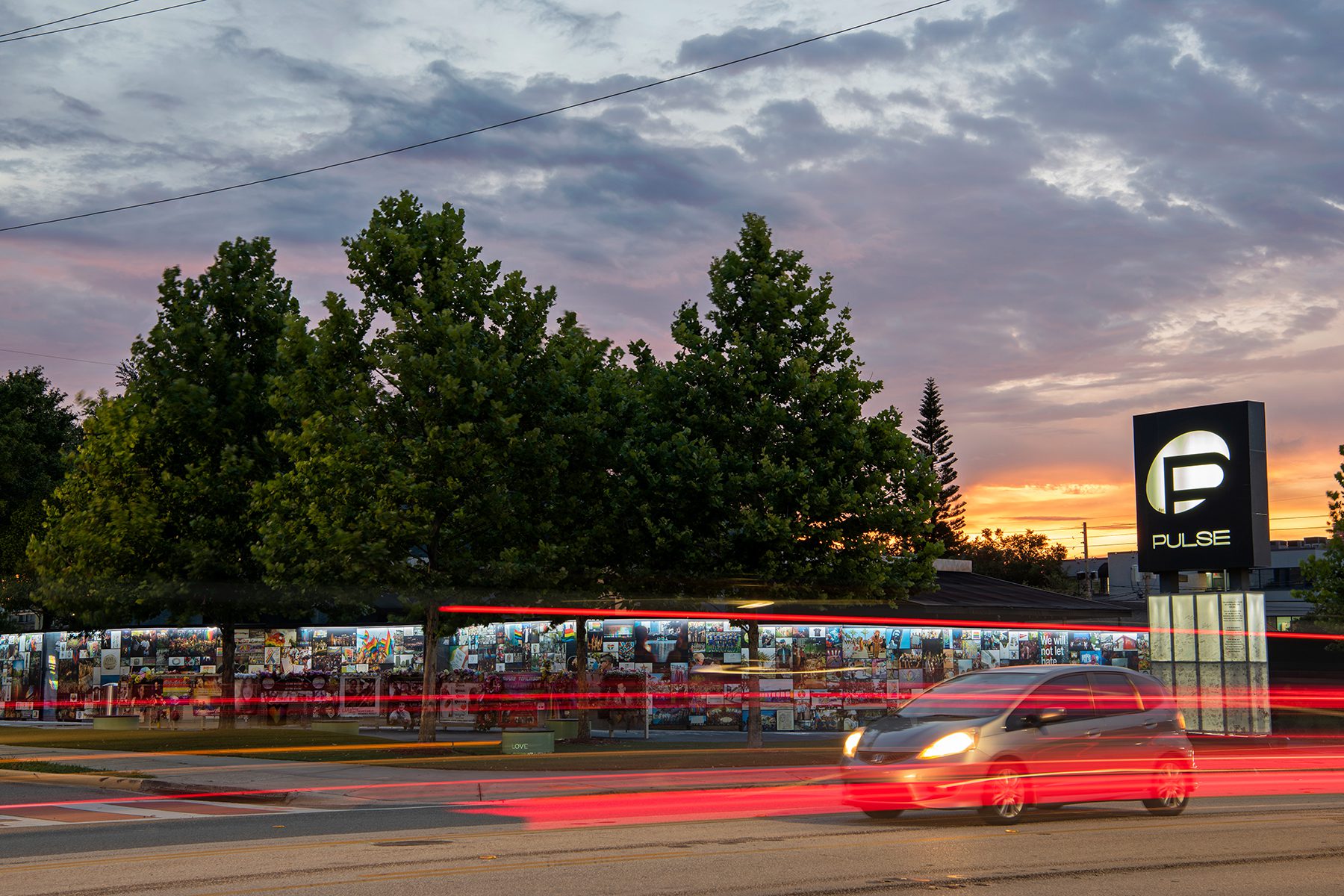
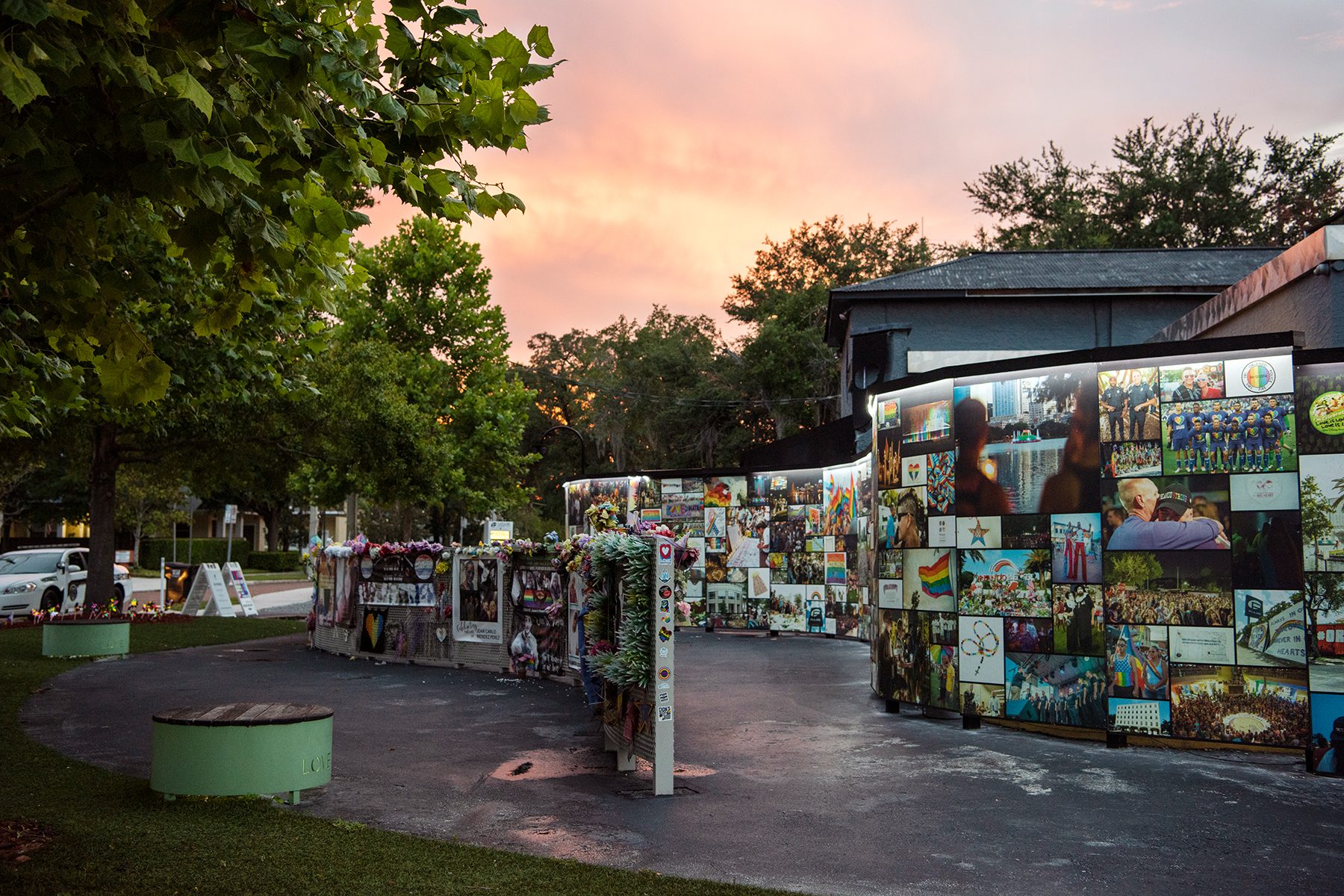
“My son’s death is being marketed as a tourist attraction,” Leinonen said.
OnePulse Foundation, the organization that maintains the memorial and museum, did not respond directly to requests to participate in this story.
Not everyone who comes to Pulse is from out of town. And not everyone is there to stare. In May, a visitor was one of the first responders who was there in 2016. He lives in Orlando, but hasn’t been back until now. He asks not to be identified in an article because he works in law enforcement and isn’t authorized to speak about that night.
As he looks at the building, he sees it as it was six years ago, in the early hours of June 12. That side door, the one with the holes, that’s where they had to move a dead man from so they could get in the building.
“How do you deal with that?” he asks. “I mean, what do you do? You just work, you just work more.”
When the work was done, he brought those images home with him. He kept thinking that if the woman in the white pants had just stayed on the porch a few seconds longer, the shooter would have missed her.
Today, he hears his elected officials refer to gay people as “groomers.”
“My main work started by arresting and putting in jail pedophiles,” he said. “I find that deeply, deeply offensive as a person that works these cases, day in day out, to make those incendiary associations.”
Christine remembers her son pushing for a world that welcomed people across the LGBTQ+ community. She remembers Christopher, the boy who never had a cavity in his life, who — even as she feared he would be harmed for being openly gay — pressed upon his mother the importance of embracing his whole self everywhere.

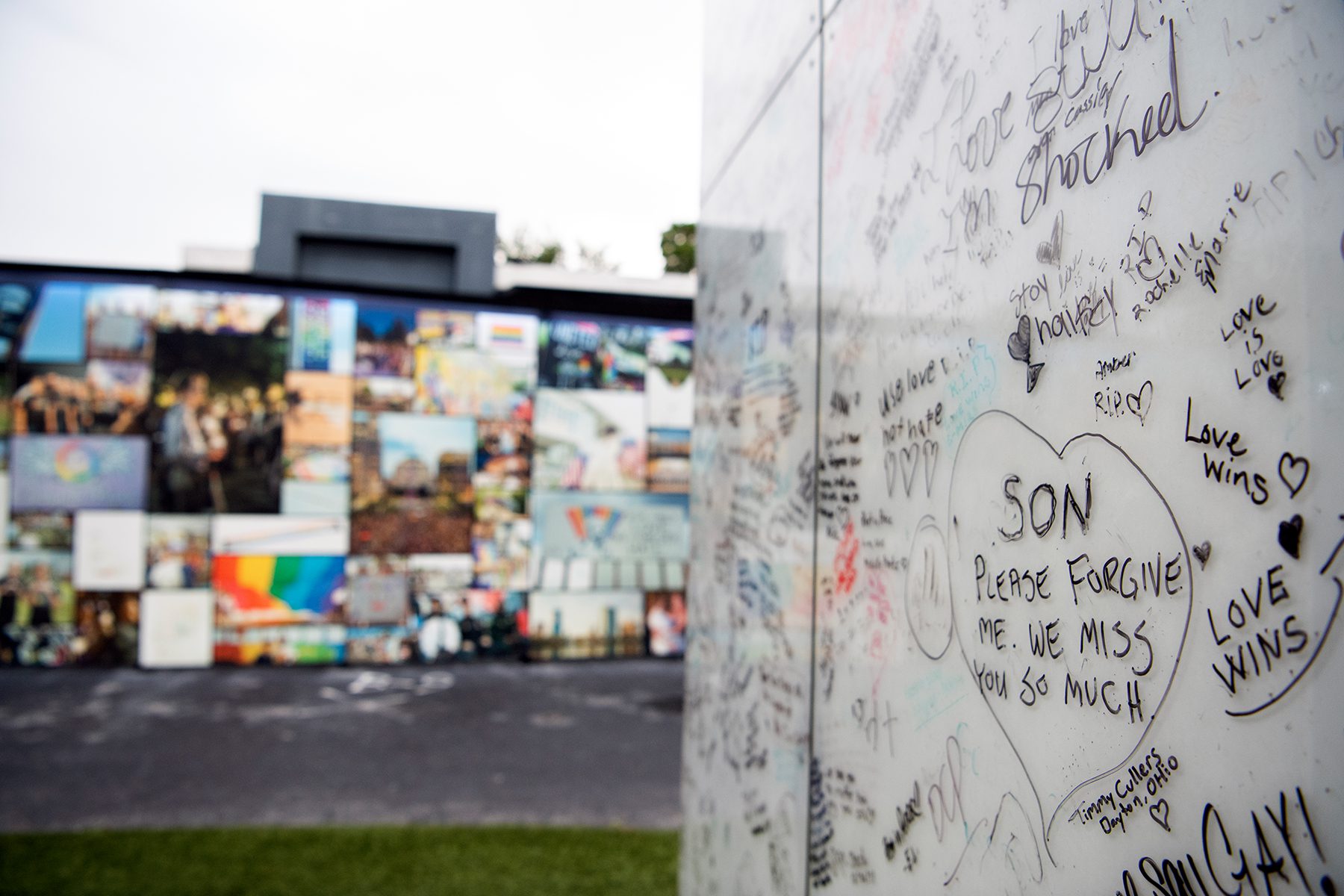
“He said, ‘Mom…this is how we get change, by openly forcing it on society.’”
Below the business sign for Pulse, organizers have built a broad white wall where visitors can write notes to victims with sharpies. Christine wrote a message to Christopher on the wall, saying she loved and missed him. Other parents wrote, too. A message in a large heart says, “SON PLEASE FORGIVE ME WE MISS YOU SO MUCH.” Another says “Love is Love.”
The most common phrase, written over and over on the wall: “We Say Gay.”









